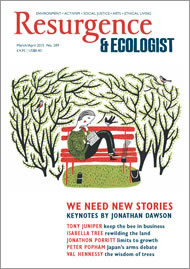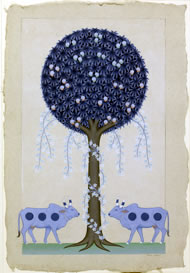For the past 10 years I have been going to Mallorca as a guest of my friend Guillem Ferrer. One day he asked me to talk about an ideal that guides all my activities. I said that the most important thing in my life is friendship. All my work is out of friendship. Resurgence & Ecologist magazine is a result of friendship. I have so many good friends who have contributed articles, artwork and money to Resurgence. The Small School has come out of friendship. Schumacher College has grown out of friendship.
Friendship is my primary principle and the bread and butter of my life. I live by friendship. For me friendship is the supreme spiritual quality. Friendship is unconditional – there are no ifs and no buts. There is no reason why somebody is a friend. You don’t say: I am your friend because you are this or that. Because you are educated, or rich, or intelligent, or handsome, or you are good to talk to. Such things don’t come to your mind. You have a friend because you want to be a friend. Friendship is all about acceptance and without any expectation. You just give, and you just receive. Friendship is rooted in deep gratitude.
In friendship you say only yes. When a friend asks you out of friendship, you can’t say no. There is only yes in friendship. If somebody asks me some help out of friendship, I say yes. And if I ask someone out of friendship, they say yes.
My friendship is not only towards humans. I also feel friendship towards Nature. I am a friend of my place and of my garden. I am a friend of trees and flowers. I am a friend of the bees. I am a friend of even the earthworms and the slugs and the snails. The weeds are my friends. Friendship is a term people use mostly for human relationships, but I use the term in a broader sense.
My children are my friends. In India we say that when your children become 16 they are no longer your children: they are your friends. ‘Friend’ is a better term than ‘son’ or ‘daughter’, because ‘son’ and ‘daughter’ carry expectations. You expect something from your children. They expect something from you as parents. As friends you don’t expect anything. You treat them in a respectful way. It is the same with my wife. She is my friend. My relationship with her is not possessive. Love liberates. There is no bondage and there is no attachment in such marriage.
The village where I live is my friend. So I accept the village as it is. I don’t sit in judgement. I love my village. I love its people, its valleys and the trees. I love the natural landscape. I accept them as my friends. I live near the ocean, and so the ocean is my friend. Then the whole Earth is my friend, and the whole world is my friend. Whatever transformation I am trying to bring in my life, in my society and in the world, I do that with a sense of friendship. The world is beautiful, but within this world we have developed some systems that need to be renewed. My home is my friend, so I clean it, I repair it, and I paint it because after a while my home needs repair and renewal. And my garden needs renewal. In the same way, politics needs renewal. So I work to bring renewal in politics and renewal in economics. It is all out of love.
When my body needs renewing and healing, I try to renew and heal it. The world is my body, and society is my body. They need healing and renewing. So my work is the work of a friendly healer. My work at the Small School is an act of friendship for children. My work for Resurgence & Ecologist magazine is an act of friendship for the readers. My work at Schumacher College is an act of friendship to promote ecology and spirituality in the world. Through meditation, good food and relaxation, I heal my body. When I am run down and tired, I say to my body: slow down, have a siesta. Similarly I say to society: have a siesta, slow down, don’t work too fast or too hard. The Buddha said: “If you determine your course with force or speed, you miss the way.”
In friendship there are no expectations and no attachment, because expectations and attachment bring disappointment. I live lightly and practise detachment. When I am detached, I can keep moving: I am not stuck, there is no bondage. Detachment brings freedom. All my work is out of profound friendship for people and for the world. I and the world are one. When I am working for the transformation of the world, I am working for the transformation of myself. The greater self. When I expand my consciousness, I become the greater self, the universal self. In this body I am the microcosm of the macrocosm.
So it’s out of friendship that I say to Mr Obama: “Look at Mr Putin and see him as a friend, then all your conflicts will be dissolved.” I say to Mr Putin: “Treat all Ukrainians as your friends. You are a Christian. What did Jesus say? ‘Love your neighbour’!” I say to Mr Netanyahu: “You have been at war with Palestinians for the past 70 years. What have you achieved? Try peace with Palestine for once, and see what happens. Through friendship all pains are healed.” I advise Palestinians: “The Jews have been in exile for 2,000 years. Now they have to come home. Welcome them. Together you can turn Palestine into a land of milk and honey.”
The best way to have a friend is to be a friend. Friendship is the easy and simple answer to all our agonies, anxieties and anguishes.
In the field of friendship I sow the seeds of love with my hands of humility. I spread the compost of kindness and irrigate the soil of my soul with the water of generosity. I am blessed with the fragrance of joy and the fruits of freedom. I give thanks with deep gratitude for all the gifts of life that I receive every day. It is sweet to be a friend, and it is a blessing to have friends.
With friendship and trust in my heart I walked 8,000 miles around the world without a penny in my pockets. I walked through communist countries, capitalist countries, Muslim countries, Christian countries, and everywhere I was fed, sheltered and loved. If I had gone as an Indian, I would have met a Pakistani or a Russian. If I had gone as a Hindu, I would have met a Muslim or a Christian. But I went as a human being, and I met human beings everywhere. My walk was an act of friendship.
Whether we are a Russian or an American, a Jew or an Arab, a Shia or a Sunni, a communist or a capitalist, whatever the label, we are human beings first and foremost. Our human identity supersedes all other identities. That is why we have to build our personal, political and ecological relationships on the foundation of friendship.
When the Buddha was breathing his last breath, Ananda asked him: “How would you like to be reincarnated in your next life?” The Buddha answered: “Not as a prophet, not as a teacher, not even as a person, but as maitreya. I wish to be reincarnated as friendship, as empathy, sympathy and loving kindness.”
Friendship is the only glue to hold humanity together. Through the philosophy of friendship we deeply realise that we are all connected, we are all related, we are all interdependent. The entire planet Earth is our home, and we are members of this one Earth community and one human family.
You might call me an idealist. Yes, I am an idealist. What have the realists achieved? Wars? Poverty? Climate change? The realists have ruled the world for far too long and have failed to achieve peace and prosperity for all. So let us give the idealists a chance and let friendship be the organising principle of our world. We may not be 100% successful. We may not achieve utopia, but let us maximise the power of friendship and minimise the force of conflicts. This is worth trying.
A new, updated edition of Satish Kumar’s book No Destination: Autobiography of a Pilgrim has recently been published by Green Books. It is available in the Resurgence online shop







